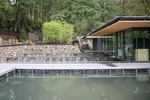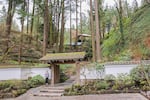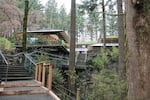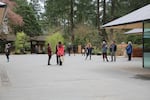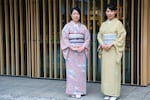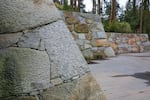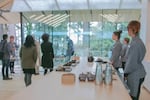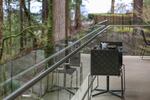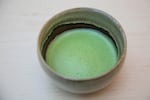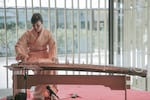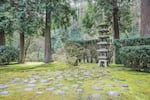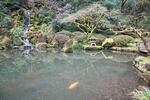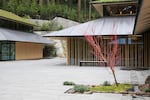
The Cultural Village is home to two new gardens: the tiny Tsubo-Niwa, which means courtyard garden (pictured), and a bonsai terrace.
Laurie Isola / OPB
The Portland Japanese Garden officially unveils its new Cultural Crossing expansion project Sunday.
The $33.5 million expansion includes a new garden entrance, gallery, teaching space, café and nearly 18-foot-tall Japanese castle wall. The Cultural Village is made up of three brand new buildings and a massive courtyard, which will act as a gateway to the five original gardens.
The courtyard will be used as an exhibition space for musicians and Kabuki theater performances starting this summer.
The street-level entrance to the garden now features a welcome center on southwest Kingston Avenue. Ascending pathways stretch from there to the Cultural Village further up the hill.
The garden has seen a steady increase in visitors over the past decade with the number climbing to 400,000 last year.
“With the growing attendance at the garden, and only 5 1/2 acres, we realized that the peace and tranquility of the garden itself, which is the foundation of the garden, was being impacted,” Steve Bloom, Portland Japanese Garden CEO, said.

Renowned architect Kengo Kuma designed the Cultural Village.
Laurie Isola / OPB
Bloom said the garden is considered one of the most authentic anywhere in the world outside of Japan. The new structure is the first public commission in the U.S. designed by renowned Japanese architect Kengo Kuma.
Kuma also designed the stadium that will be the centerpiece of the 2020 Olympics in Tokyo.
He said he was attracted to the Portland garden because the original designer managed to combine what he calls the “Japanese spirit” with Portland’s unique landscape.
Kuma worked with garden master craftsman Sadafumi Uchiyama to add 3.4 acres of usable space to the garden’s 9.1-acre facility.
Uchiyama said the garden’s architecture, carpentry and landscaping are all meant to act as teaching tools for visitors and students.
The new buildings will house a Japanese garden teaching program for both amateur and professional gardeners. Many of the artisans who were involved with the construction of the Cultural Village will stay on as instructors.
Uchiyama said he expects students to come from all over the world to take classes in Portland.
The garden and the Cultural Village will be open for members Saturday. The public is invited to visit the new facilities beginning Sunday.
Starting this weekend, general admission to the garden will also increase from $9.50 to $14.95.
